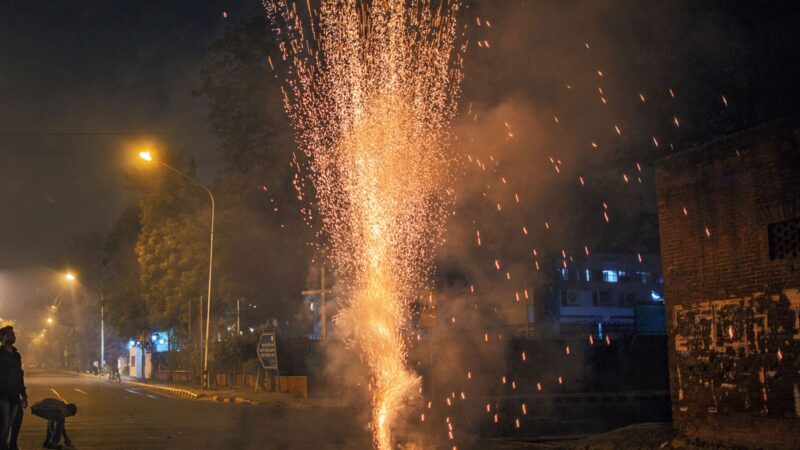
After the vibrant Diwali celebrations filled with dazzling fireworks and festive lights, a thick layer of smoke has engulfed the skies over Bihar. The day following the festival, the air quality across several major cities in the state has drastically worsened. Cities like Patna, Gaya, Bhagalpur, Darbhanga, and Muzaffarpur have reported a significant decline in air quality. Early morning residents in these cities struggled to breathe due to the dense fog and smoke. The festive fireworks from Diwali night have now transformed into a hazardous pollution problem, making the air toxic.
Declining Air Quality in Major Bihar Cities
The Meteorological Department has confirmed that the speed of the wind significantly slowed down after Diwali night. According to the Patna Meteorological Center, wind speeds have reduced to just 2 to 3 kilometers per hour. As a result, harmful pollutants have become trapped in the atmosphere, contributing to dangerously high pollution levels in cities like Patna, Gaya, Darbhanga, Bhagalpur, and Muzaffarpur. The Air Quality Index (AQI) in these regions has been recorded between 150 and 300, falling in the “Moderate to Poor” category, which is harmful to health.
When the wind slows down, dust particles and smoke get trapped in the lower layers of the air, creating a smog layer. This thick fog and smoke mixture was visibly present in many areas of the city during the early hours. The deterioration in air quality is evident, making it difficult for people to breathe, especially in the morning.
Weather Update: No Relief in Sight
As per the Bihar Weather Report on October 20, the minimum temperature recorded in Valmikinagar was 20.4°C, while Patna had a minimum of 24.7°C and a maximum of 33.8°C. The slow-moving winds and the mild warmth in the air have contributed to the stagnant pollutants in the atmosphere. As a result, the air feels heavy, and the smog layer in the sky has thickened. The Meteorological Department has warned that the cold weather is not expected to make an appearance soon, and the mild heat will persist, further aggravating the pollution situation.
Sharp Spike in Pollution Levels Post-Diwali Celebrations
Data from Bihar Air Pollution Monitoring reveals that the levels of PM 2.5 and PM 10 particles in the air spiked significantly after Diwali night, due to the fireworks and firecrackers. In several areas of Patna, the AQI crossed 280, approaching the critical “Severe” category. Experts predict that the air quality may not improve significantly over the next couple of days, as the wind conditions are unlikely to change drastically.
Health Experts Urge Caution
Health specialists have strongly advised the public to take necessary precautions. They recommend avoiding morning walks, wearing masks when stepping outside, and using air purifiers indoors. Vulnerable groups, including children, elderly individuals, and asthma patients, should take extra care and avoid exposure to the polluted air.
The Need for Awareness Post-Festivals
Though the festive glow of Diwali has faded, the smoke from the celebrations continues to linger in the air across Bihar. The escalating pollution levels have once again raised alarms about the adverse effects on both health and the environment. The Meteorological Department has issued a clear warning that unless wind speeds pick up, the smog layer will persist over Bihar for the time being.
In this scenario, it is crucial for the public to understand their responsibility in reducing pollution. Rather than relying on firecrackers, it is advisable to celebrate the festival by lighting diyas (oil lamps), ensuring that the next Diwali remains a festival of light rather than one filled with harmful smoke.
The Dangers of Persistent Pollution in Bihar
The air quality in Bihar, particularly after the festive season, reflects a serious environmental concern. Poor air quality has direct consequences on public health, leading to respiratory problems and other ailments. The presence of harmful particles like PM 2.5 and PM 10 in the air can significantly affect individuals with pre-existing conditions like asthma, lung diseases, and even heart issues. The state is now facing a situation where the health of its citizens is at risk due to excessive air pollution.
Health experts have long warned about the dangers of air pollution, especially during festivals like Diwali, when the excessive use of fireworks exacerbates the problem. Fireworks release large amounts of particulate matter into the air, which when combined with the already existing pollutants, leads to a spike in the AQI levels. This not only makes the air hazardous but also creates an environment where breathing becomes a challenge, particularly for those who are more vulnerable.
The Role of Citizens in Controlling Air Pollution
Citizens must take an active role in minimizing pollution and reducing its harmful effects. During festive times, alternatives to traditional fireworks should be considered. Digital fireworks or eco-friendly crackers can be used to ensure that the celebrations do not compromise the health of the community. It’s also essential for individuals to spread awareness about the importance of a clean environment and encourage others to participate in keeping the air clean.
Long-Term Solutions for Air Pollution in Bihar
While the immediate aftermath of Diwali presents a clear and present challenge, long-term solutions are necessary to address the root causes of air pollution. The state government needs to focus on implementing stronger policies to curb the use of firecrackers during festivals. Stricter regulations on industrial emissions and vehicular pollution are also critical to reducing the overall pollution levels. Additionally, citizens need to be educated on sustainable practices that can help mitigate pollution on a larger scale.
The role of the government, coupled with the collective effort of the citizens, is vital in ensuring that the air quality improves and remains at a safe level throughout the year. It’s time to adopt a more responsible approach to celebrating festivals and everyday life to ensure the well-being of all residents.
As Bihar continues to battle with the rising levels of pollution post-Diwali, it is important for every individual to play their part in ensuring a cleaner and healthier environment. With awareness, commitment, and collective action, it is possible to reduce the harmful effects of pollution and make festivals like Diwali enjoyable without compromising public health. The time to act is now—let’s work together for a brighter, cleaner, and healthier future for all.
Share this:
- Click to share on WhatsApp (Opens in new window) WhatsApp
- Click to share on Facebook (Opens in new window) Facebook
- Click to share on Threads (Opens in new window) Threads
- Click to share on Reddit (Opens in new window) Reddit
- Click to share on Telegram (Opens in new window) Telegram
- Click to share on X (Opens in new window) X
- Click to share on LinkedIn (Opens in new window) LinkedIn


